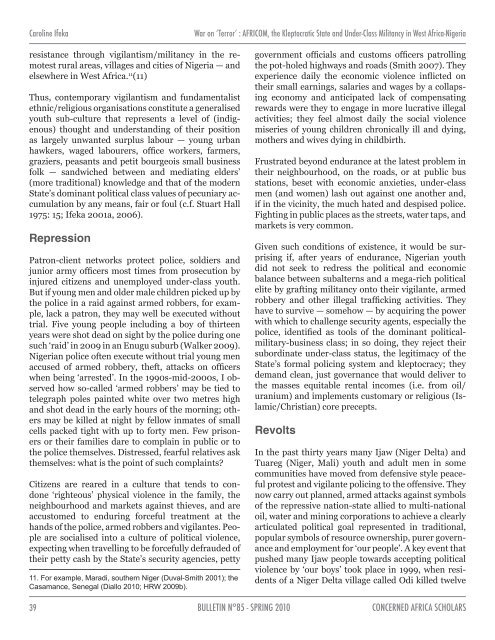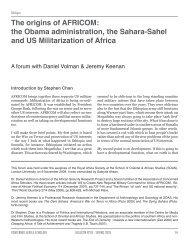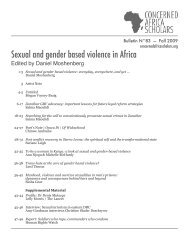Western Sahara and the United States' geographical imaginings
Western Sahara and the United States' geographical imaginings
Western Sahara and the United States' geographical imaginings
You also want an ePaper? Increase the reach of your titles
YUMPU automatically turns print PDFs into web optimized ePapers that Google loves.
Caroline Ifeka War on ‘Terror’ : AFRICOM, <strong>the</strong> Kleptocratic State <strong>and</strong> Under-Class Militancy in West Africa-Nigeria<br />
resistance through vigilantism/militancy in <strong>the</strong> remotest<br />
rural areas, villages <strong>and</strong> cities of Nigeria — <strong>and</strong><br />
elsewhere in West Africa. 11 (11)<br />
Thus, contemporary vigilantism <strong>and</strong> fundamentalist<br />
ethnic/religious organisations constitute a generalised<br />
youth sub-culture that represents a level of (indigenous)<br />
thought <strong>and</strong> underst<strong>and</strong>ing of <strong>the</strong>ir position<br />
as largely unwanted surplus labour — young urban<br />
hawkers, waged labourers, office workers, farmers,<br />
graziers, peasants <strong>and</strong> petit bourgeois small business<br />
folk — s<strong>and</strong>wiched between <strong>and</strong> mediating elders’<br />
(more traditional) knowledge <strong>and</strong> that of <strong>the</strong> modern<br />
State’s dominant political class values of pecuniary accumulation<br />
by any means, fair or foul (c.f. Stuart Hall<br />
1975: 15; Ifeka 2001a, 2006).<br />
Repression<br />
Patron-client networks protect police, soldiers <strong>and</strong><br />
junior army officers most times from prosecution by<br />
injured citizens <strong>and</strong> unemployed under-class youth.<br />
But if young men <strong>and</strong> older male children picked up by<br />
<strong>the</strong> police in a raid against armed robbers, for example,<br />
lack a patron, <strong>the</strong>y may well be executed without<br />
trial. Five young people including a boy of thirteen<br />
years were shot dead on sight by <strong>the</strong> police during one<br />
such ‘raid’ in 2009 in an Enugu suburb (Walker 2009).<br />
Nigerian police often execute without trial young men<br />
accused of armed robbery, <strong>the</strong>ft, attacks on officers<br />
when being ‘arrested’. In <strong>the</strong> 1990s-mid-2000s, I observed<br />
how so-called ‘armed robbers’ may be tied to<br />
telegraph poles painted white over two metres high<br />
<strong>and</strong> shot dead in <strong>the</strong> early hours of <strong>the</strong> morning; o<strong>the</strong>rs<br />
may be killed at night by fellow inmates of small<br />
cells packed tight with up to forty men. Few prisoners<br />
or <strong>the</strong>ir families dare to complain in public or to<br />
<strong>the</strong> police <strong>the</strong>mselves. Distressed, fearful relatives ask<br />
<strong>the</strong>mselves: what is <strong>the</strong> point of such complaints?<br />
Citizens are reared in a culture that tends to condone<br />
‘righteous’ physical violence in <strong>the</strong> family, <strong>the</strong><br />
neighbourhood <strong>and</strong> markets against thieves, <strong>and</strong> are<br />
accustomed to enduring forceful treatment at <strong>the</strong><br />
h<strong>and</strong>s of <strong>the</strong> police, armed robbers <strong>and</strong> vigilantes. People<br />
are socialised into a culture of political violence,<br />
expecting when travelling to be forcefully defrauded of<br />
<strong>the</strong>ir petty cash by <strong>the</strong> State’s security agencies, petty<br />
. F�� ��x�mp���, M�����, ����������� N����� ���v���Sm���� 00 ��; �����<br />
C����m�����, S�������� ������� 0 0; HRW 009b��.<br />
9<br />
BULLETIN N°85 - SPRING 2010<br />
government officials <strong>and</strong> customs officers patrolling<br />
<strong>the</strong> pot-holed highways <strong>and</strong> roads (Smith 2007). They<br />
experience daily <strong>the</strong> economic violence inflicted on<br />
<strong>the</strong>ir small earnings, salaries <strong>and</strong> wages by a collapsing<br />
economy <strong>and</strong> anticipated lack of compensating<br />
rewards were <strong>the</strong>y to engage in more lucrative illegal<br />
activities; <strong>the</strong>y feel almost daily <strong>the</strong> social violence<br />
miseries of young children chronically ill <strong>and</strong> dying,<br />
mo<strong>the</strong>rs <strong>and</strong> wives dying in childbirth.<br />
Frustrated beyond endurance at <strong>the</strong> latest problem in<br />
<strong>the</strong>ir neighbourhood, on <strong>the</strong> roads, or at public bus<br />
stations, beset with economic anxieties, under-class<br />
men (<strong>and</strong> women) lash out against one ano<strong>the</strong>r <strong>and</strong>,<br />
if in <strong>the</strong> vicinity, <strong>the</strong> much hated <strong>and</strong> despised police.<br />
Fighting in public places as <strong>the</strong> streets, water taps, <strong>and</strong><br />
markets is very common.<br />
Given such conditions of existence, it would be surprising<br />
if, after years of endurance, Nigerian youth<br />
did not seek to redress <strong>the</strong> political <strong>and</strong> economic<br />
balance between subalterns <strong>and</strong> a mega-rich political<br />
elite by grafting militancy onto <strong>the</strong>ir vigilante, armed<br />
robbery <strong>and</strong> o<strong>the</strong>r illegal trafficking activities. They<br />
have to survive — somehow — by acquiring <strong>the</strong> power<br />
with which to challenge security agents, especially <strong>the</strong><br />
police, identified as tools of <strong>the</strong> dominant politicalmilitary-business<br />
class; in so doing, <strong>the</strong>y reject <strong>the</strong>ir<br />
subordinate under-class status, <strong>the</strong> legitimacy of <strong>the</strong><br />
State’s formal policing system <strong>and</strong> kleptocracy; <strong>the</strong>y<br />
dem<strong>and</strong> clean, just governance that would deliver to<br />
<strong>the</strong> masses equitable rental incomes (i.e. from oil/<br />
uranium) <strong>and</strong> implements customary or religious (Islamic/Christian)<br />
core precepts.<br />
Revolts<br />
In <strong>the</strong> past thirty years many Ijaw (Niger Delta) <strong>and</strong><br />
Tuareg (Niger, Mali) youth <strong>and</strong> adult men in some<br />
communities have moved from defensive style peaceful<br />
protest <strong>and</strong> vigilante policing to <strong>the</strong> offensive. They<br />
now carry out planned, armed attacks against symbols<br />
of <strong>the</strong> repressive nation-state allied to multi-national<br />
oil, water <strong>and</strong> mining corporations to achieve a clearly<br />
articulated political goal represented in traditional,<br />
popular symbols of resource ownership, purer governance<br />
<strong>and</strong> employment for ‘our people’. A key event that<br />
pushed many Ijaw people towards accepting political<br />
violence by ‘our boys’ took place in 1999, when residents<br />
of a Niger Delta village called Odi killed twelve<br />
CONCERNED AFRICA SCHOLARS




